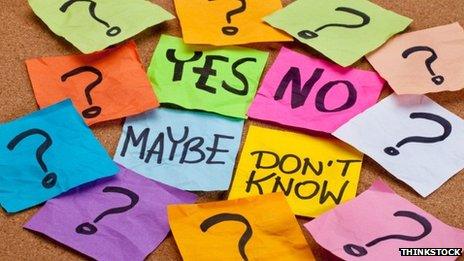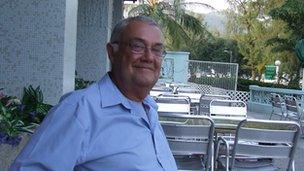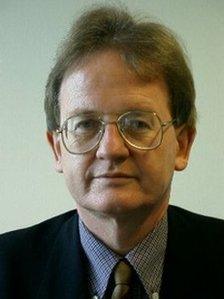PCC Elections: Why did people vote?
- Published

Many people did not use their right to vote
Low turnouts are being reported across England and Wales after the first police and crime commissioner (PCC) elections took place.
Elections for the role of PCC were held in 41 force areas with controversy arising already over low numbers.
Among the first dozen or so areas to confirm turnouts on Friday morning, almost all ranged from 13 to 20%.
BBC News spoke to two voters about whether or not they supported the commissioner elections.
The spoilt ballot paper

Stuart Worthington said he was the 10th person to vote in his local polling station
Stuart Worthington, from Warrington, in Cheshire, is a retired electrical engineer.
The 65-year-old said he and his wife were the 10th and 11th people to vote in the seven hours since the polls opened at their polling station in the village of Long Barn.
He said while he believed it was important to exercise his right to vote he would have preferred a referendum on whether or not he wanted a PCC in the first place.
Mr Worthington said: "A lot of people went to an awful lot of trouble to secure the vote for us so it really is your duty to vote if you can.
"But I didn't agree with what we were voting for, I didn't know anything about any of the candidates and three of them were affiliated to political parties - I think the police should be a-political."
He added he had spoilt his ballot paper for the first time in his life.
'Pretty mysterious'
"When will politicians realise that just because they think police commissioners are a great idea, doesn't mean that the rest of the population agrees," he said.
"Most people don't give a damn about this. If the system's not broke they don't need to fix it.
"No one asked if we wanted to change the system, there wasn't a box on the ballot form for 'none of the above' so I made my own and ticked that."
He said he felt many people had stayed away from polling stations because of the low level of publicity about the elections, or because they were happy with the old system of police authorities.
"My 91-year-old aunt is very bright and takes an interest in elections but she's registered blind and the only information seems to be on the internet," he said.
"There's been no leaflets come or candidates call. The whole process is pretty mysterious.
He added: "Most people didn't vote because they don't want change."
Important to take part

Colin Bullen said he supported the concept of PCCs
Colin Bullen, 65, from Tonbridge, in Kent, feels frustrated with the low turnout of voters in the PCC elections.
The retired deputy IT manager said he felt complaining about a lack of information was a poor excuse not to vote.
He said he was in favour of the PCC elections because it was important for democracy to ensure the role was an elected one.
He said: "I voted in the PCC elections as people died so we could vote - I find it irritating that people didn't.
"In some countries people queue up for hours to vote, other countries don't have the vote at all, in this country people say they don't know anything about the candidates and don't bother [to vote].
"If one wants democracy one must take part, not just carp that it is all too difficult."
He added he had not struggled to find out about the candidates.
'Made the effort'
"I read the candidates' views in the local paper, heard them on Radio Kent and looked them up on the web," he said.
He added he had also helped distribute leaflets for a friend who was standing although he was not a member of his political party.
"If the average person cannot be bothered to make any such effort how on earth are the candidates supposed to reach them?" he said.
Mr Bullen said he did not disagree with people who spoilt their ballot papers if they did not want to vote for any of the candidates.
"At least they made the effort which is better than sitting at home saying 'I don't know anything about it'.
"As the old saying goes 'You can lead a horse to water but you cannot make it drink'."
- Published17 November 2012